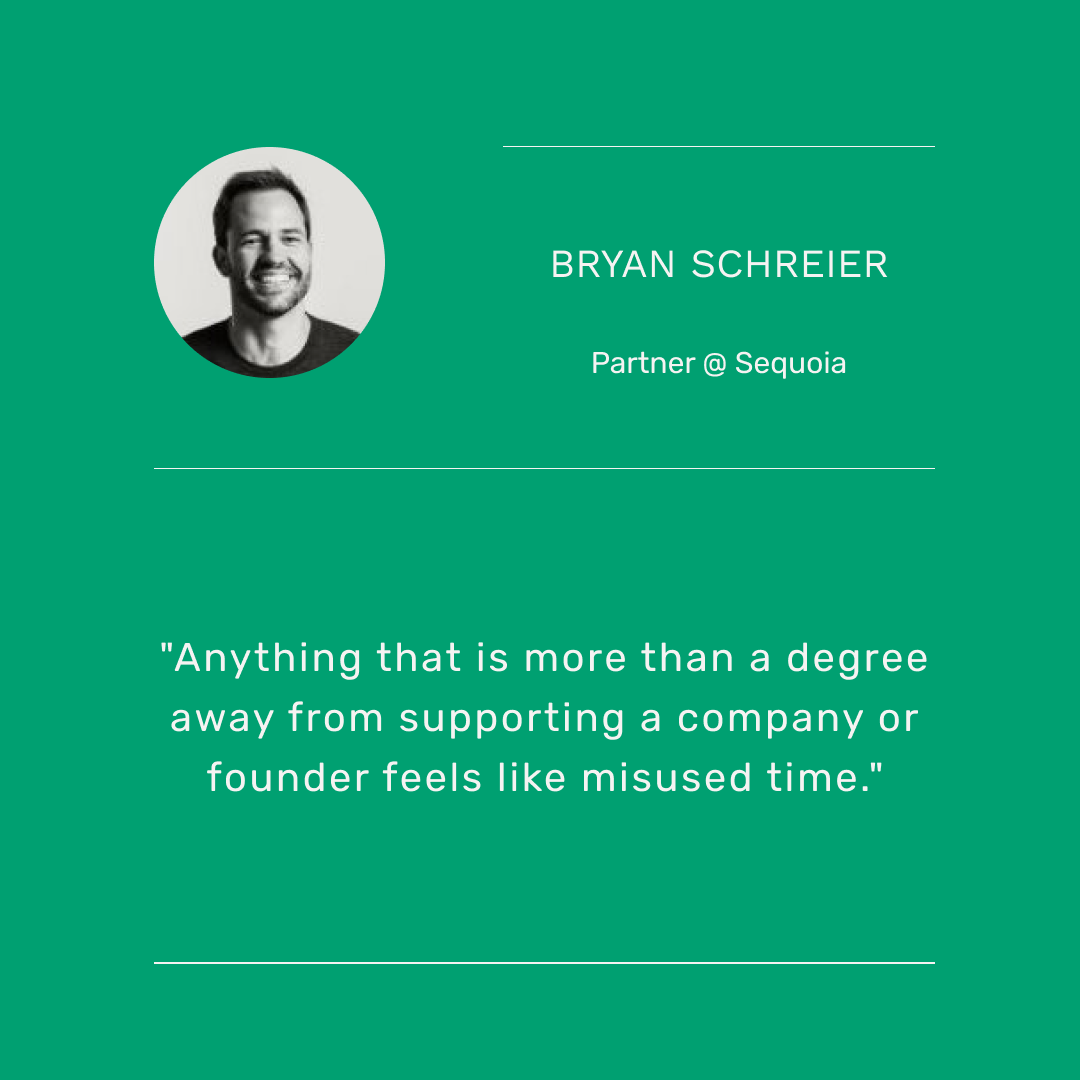Good morning 👋
This week’s deep dive is on Bryan Schreier (@schreier). Bryan is a partner at Sequoia, a position he has held for the past 15 years.
Similar to other investors we have studied, he prefers to work in the shadows and let founders earn the spotlight. He has built his career in service to others, and his work at Sequoia is a reflection of that.
Here are 15 lessons from studying Bryan and his investment philosophy.
Explore all investor deep dives here.
P.S. We’re running our fourth annual VC comp survey.
If you work full-time in venture, growth equity, or private equity, this is a chance to let us know how you’re compensated, and we’ll let you know if you’re over / underpaid.
LESSONS
Specializing will give you tunnel vision. If Sequoia had a checklist of things they needed new investments to answer, they would have missed most of their winners.
Someone who understands a problem space better than anyone else will be the absolute best steward for their company. They’re never going to give up on their idea, and no one can compete with their instincts and commitment.
When it comes time to choose your investor, there are two questions you should ask: how much impact the investor and their platform can make, and how important your company will be to them.
Product/market fit is not always a clear-cut, black-and-white process. It’s usually a gradual and ongoing one that requires constant effort and evaluation.
Being a founder’s first call is not given; it’s earned. Real company building is not glamorous work most of the time, and founders lean on the people who are there when things get aren’t glamorous.
You have two ears and one mouth for a reason. This is a Sequoia motto from Don Valentine. Most of the best investors in the world listen far more than they talk.
You want to create fast feedback loops in all things (not just business). Always ask for feedback, especially with people you don’t know well.
Internal apps have become the lifeblood of business operations. Hosting and managing these apps has become a growing issue that can be solved with low-code tools.
QUOTES
"Anything that is more than a degree away from supporting a company or founder feels like misused time."
"We try not to specialize. The companies I find compelling are ones that are somehow rewiring an industry."
"It takes a ton of extra time and energy to work productively with people you don’t trust. So I switched my default assumption to trust, and now instead of having to change my position 95 percent of the time, I only have to change it 5 percent of the time."
"Whether we like it or not, there’s some kind of power dynamic in every conversation, and I always try to give that power to the other person. It’s an opportunity for me to learn."
"The goal of a board meeting should be to maximize the value you get as a founder while minimizing the amount of time you spend preparing."
"Board decks don’t actually have to be decks. Qualtrics, Domino, and Thumbtack employ Amazon-style ‘memos’ that communicate the same information through text. It really comes down to the most efficient and effective mode of communication for the management team."
"Treat board meeting prep as an opportunity to pull yourself out of the day-to-day and take a look at your company as if you were sitting on the moon viewing the earth: Are you executing? Are you innovating? Are you hiring? Are you building a management team? Are you growing the customer base? Are you doing so according to the last plan you laid out? And is that plan still good enough to win or do you need a new plan and new targets?"
Together with the Ultimate VC Resource Library
Your cheat code to learning the VC game 📶
We started our careers in venture. After about a week, we had a realization.
We had no idea what we were doing.
Turns out, we weren’t alone.
Junior VCs don’t get training. You’re forced to figure it out on your own.
Learning the rules, tools, and players takes FOREVER to learn. That’s why we made the ultimate VC resource library to speed up the learning curve.
READING
How'd we do this week?
Thanks for reading this far and giving us a little bit of your attention this week.
Feel free to unsubscribe whenever this stops becoming valuable to you.
📌 P.S. We’re hiring: We're looking for a social media manager (somebody who loves venture and memes) to grow our Twitter and LinkedIn accounts.
Do you know someone who’s a good fit? Earn a $500 referral bonus when they reach a final interview.







